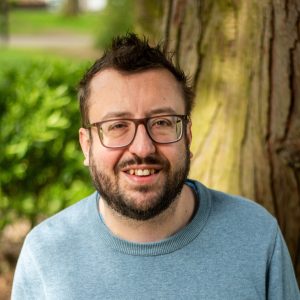November 19, 2024, by bbztlg
Life and learning: Navigating the PhD journey as a mature student
PhD researcher Dan Beever shares his reflections after completing the first year of his PhD journey as a mature student at Nottingham.
Hi, I’m Dan, a mature student in the second year of my PhD in the School of Medicine. Undertaking a PhD later in life can seem daunting but the experience can be immensely rewarding. Whilst many prospective PhD students may find it difficult to imagine balancing the complexities of life (eg kids!) with academic study, the skills and experience you bring will often make the transition easier than you think. However, there are a few reflections from my first year as mature student that I wanted to share with others embarking on their PhD journey.
Getting to know your people
It is really important to get to know other people, whether that is in your department, the wider University or those external to it, and particularly other students. A PhD is a significant time commitment and it can be really tempting to ignore the relationship-building side of things. As someone coming from full-time employment and with lots of responsibilities and commitments in my personal life, initially it felt like something I didn’t really have time for but I’m so grateful now that I made time for it.
A PhD might seem like a largely solo endeavour but it’s an ultimately a team effort to get through it. Of course, your supervisors will be a huge part of this but it’s really important that you have a network of people that you can reach out to, and for different reasons – in some cases, it might be something very practical about your PhD such as how to undertake a certain test, or it might be that you just need to let off steam about challenges you’re facing. Good colleagues are essential whatever the context, including your PhD, and so take any opportunities you get to connect with others, whether virtual or in person.
I personally struggle to make events outside of core hours (eg social gatherings), but departmental meetings and training events are a great way to meet new people. Social media is also a useful tool for networking and can be particularly helpful in finding people who have a closer crossover with your PhD, in terms of topic area and methodology, than you might find internally – I’ve used it to find a group of other qualitative researchers working in cystic fibrosis, which is the focus of my PhD.
Time for yourself
Time management is PhD 101 but when there always seems to be something to do on your project, finding time for yourself can be difficult, especially when time outside your PhD is often not your own! As a dad to two young children, most of my ‘spare time’ is spent taking them to various activities after school and at weekends. Whilst these are often great opportunities to do a bit of reading for my PhD, it is really important to find time for yourself and do something that allows you to relax and switch your mind off from your research for a while.
Little and often can sometimes be the most achievable and for me, this might just be 10 minutes sitting on the sofa playing computer games! Often easier said than done, but some form of exercise is also great for your mental health (as fellow PhD student Maya touches upon here), even if just a quick walk around the block. As an added bonus, these moments of downtime often inadvertently spark the answer or inspiration needed to move forward with my PhD when I get back to my desk!
Adjusting your perspective
As someone coming from employment to my PhD, I very much had my project management hat on when starting. Such skills are obviously very useful but it was my supervisor who helped me to realise that a PhD is much more than just delivering a project – it’s a period of academic freedom like no other and the opportunity to develop and challenge yourself, and really own what you’re doing.
To me, this was a bit of a lightbulb moment and led to me thinking much more critically about ‘why’ of my research, such as the methods I’d planned, my interests and where I wanted to be at the end of the process. It’s not to say I’ve got this cracked, it’s ongoing, but I feel like I’m a better researcher for this new perspective. I’d encourage all PhD students to take the time to really reflect on this for themselves at an early stage.
It will mean spending a lot of time reading and exploring things, often with no tangible output. This can feel quite disconcerting when you’re used to delivering something but it is all part of the process. Of course, every PhD is different and you need to make sufficient progress to get through your first year review, but for me, the first year is about setting you up for what comes in the second and third years, and beyond. Embrace the opportunity!
Written by Dan Beever
No comments yet, fill out a comment to be the first

Leave a Reply